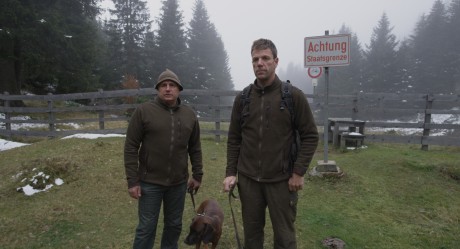


Nikolaus Geyrhalter: The Border Fence

This review is written by Georg Zeller, film director & cameraman, Bolzano Italy.
I start my review with a spoiler, the last scene of Nikolaus Geyrhalter’s newest documentary: A group of policemen opens a container full of rolls of wire fence. One of them steps in, everything ok. The officer smiles and says: „This is the famous border fence, we have to inspect it but we hope it will continue to lie here forever.“
In the end, the fence hasn’t been built. And even policemen appreciate. Maybe because the numbers of people wanting to cross this border on their way to Germany or Sweden were much lower than expected. Maybe because even the politicians planning it, understood that a fence in this very point of Europe would be a strange, if not dangerous sign.
The film examines the atmosphere and reactions when in 2016/17 the idea of building a new fence along
the border of the Brenner came up, a mountain pass and important road and train connection between Austria and Italy, nowadays mainly a site of a huge outlet center attracting shoppers from both sides. This border is dividing also two parts of the region of Tyrol. The southern part of it was gained by Italy in the first World War. After that, a troubled history in the middle of two fascist states signed the first decades of this division until the idea of a united Europe losened it again since the 1990’s.
I had just finished film school in those years when I was sent as a cameraman for ORF to film the poles of the Brenner’s barriers been sawn off. Heads of government of both countries and of both Tyrols applauded and spoke enthusiastically about their common future. As an inhabitant of this place – but with roots elsewhere – what I had regularly lived before that date, had finally become official: being a citizen of Europe.
These historical backgrounds may be the main reason why the people Geyrhalter talks to are very sceptical about a new „constructional measure“ (as the original title „Die bauliche Massnahme“ calls the fence in officialese), even those who are fearing those people walking with just a plastic bag along the freeway.
But the interviews (mostly in slow wide images and cuts on black as we are used from this author, but this time not hiding his leading of the talks) are also full of surprises. A lady who characterizes herself as being proud of her tiny mountain valley and its traditions, and after having expressed her fear that foreigners may completely undermine the religious identity of the place, is cooking lunch for the construction workers who are digging holes for a tunnel just outside her house. They are all of Senegalese origin… „We talk with hands and feet and respect each other“.
This is probably the main and important message of the film: When you personally meet the people („Let’s stop to call them migrants“ as one interviewee puts it), your fear may vanish. „Why should we fear someone who had to flee from war?“ says the organic farmer and tells the story of how he helped out a lost Ukrainian truck driver who was first treated badly by local police, but when he had the chance to tell his life story became a person treated with at least some respect.
In the film, only who has no direct contact to people passing through their valley, remains in the fear until the end, sometimes expressing absurd opinions („the people I see here are rich and healthy, they could have also survived in war.“). Thankfully, politicians are heard only through televisions hanging in the bars of the place – the filmmaker repeatedly cuts them away in the middle of their repetitive speeches – whereas we never see any migrants in the film, not even in the mountain meadow where the border is simply signed by a road sign.
The „crisis“ proposed as such by politicians remains thus in fact a phantasma and luckily does so also their „solution“ of a new fence. Let’s hope that also elsewhere in the world border fences will stay in their containers forever.
Austria, 2018, 112 mins.